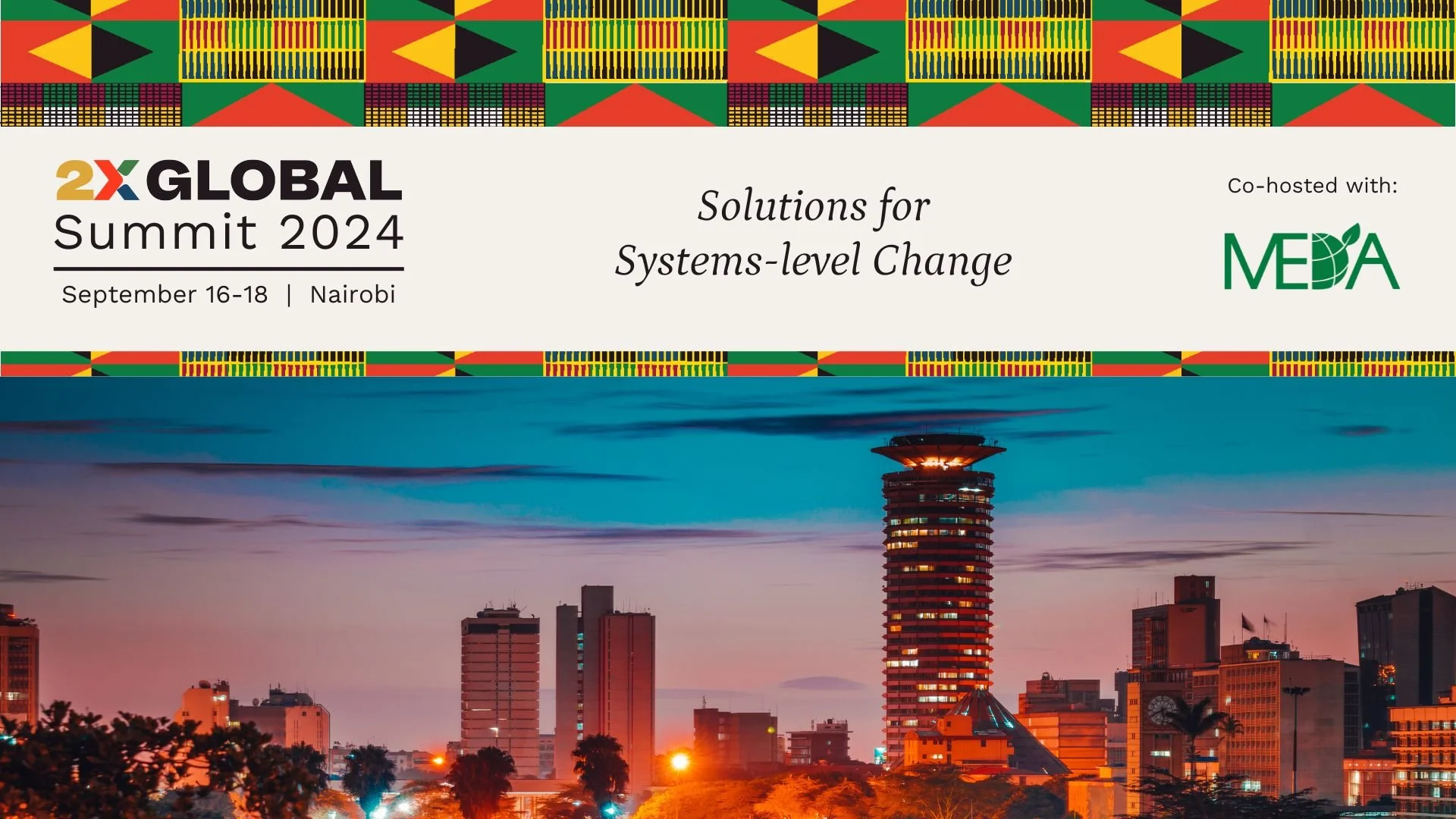Uniting to address gender financing challenges: Thoughts from Dr Dorothy Nyambi, President of 2024 Co-Host MEDA
This September, Nairobi, Kenya, will host the first-ever 2X Global Summit on African soil, bringing together leaders in finance, technology and innovation to address the global gender financing gap. This summit offers a platform to explore how gender-lens investing can drive economic growth in emerging economies, taking a systems correction lens and leveraging the tech sector, which is emerging as a key engine of development.
Dr Dorothy Nyambi, President & CEO - MEDA
Post-pandemic, Africa’s economic prospects were promising, yet the continent's GDP growth fell from 4.1% in 2022 to 3.1% in 2023. Despite this setback, forecasts suggest that with strategic policies and stable conditions, growth could rebound to 3.7% in 2024 and reach 4.3% by 2025, positioning Africa as the world’s second-fastest growing region.
To realise this potential, African economies must diversify into productivity-enhancing sectors like agri-food and high-skilled services. However, the financing gap in these areas is a staggering $402 billion annually. Closing this gap requires mobilising resources, trusting Africa as an investible ecosystem, attracting and scaling private investment, and, crucially, allowing the finance to meet the women where they are, rather than impose criteria to which they must structure to access the funds.
Women are the backbone of Africa’s economy, making up 58% of the continent’s self-employed population and contributing 13% to its GDP. Sub-Saharan Africa boasts one of the highest rates of female entrepreneurship globally, with 26% of women engaged in entrepreneurial activities. In Africa, one in three women intends to start a business, compared to one in six globally. African women reinvest up to 90% of their incomes in education, health, and nutrition, far outpacing their male counterparts, who reinvest around 40%. This reinvestment is transforming societies across the continent. The female economy, the world’s largest emerging market, has the potential to add $12 trillion to global GDP.
Achieving gender parity in financing and private equity is essential for accelerating and sustaining economic growth and creating valuable employment opportunities. We need to close a $42 billion funding gap for women entrepreneurs. The World Economic Forum estimates that bridging this gap could boost Africa’s economic growth by $316 billion.
“Women are the backbone of Africa’s economy, making up 58% of the continent’s self-employed population and contributing 13% to its GDP.
Sub-Saharan Africa boasts one of the highest rates of female entrepreneurship globally, with 26% of women engaged in entrepreneurial activities.
In Africa, one in three women intends to start a business, compared to one in six globally. African women reinvest up to 90% of their incomes in education, health, and nutrition, far outpacing their male counterparts, who reinvest around 40%.”
Yet, female entrepreneurs in Africa continue to face persistent challenges. Cultural, financial, and institutional barriers limit their economic participation, and they are often mischaracterised as high-risk or liabilities. They also bear a disproportionate share of family responsibilities, which increases economic dependence and limits their influence. These stereotypes and barriers perpetuate a cycle of inequality that hinders women entrepreneurs across the continent.
A 2020 study on gender bias in equity, debt, and philanthropic funding decisions for early-stage African ventures found significant evidence of a negative impact on female founders' ability to secure equity financing. Women-led startups also face lower probabilities of securing debt financing and receive smaller amounts when they do. The study recommends implementing gender-lens policies to promote equality in investment decisions, including incentive programs, networking and promotional support for female-led startups, and government funding based on project performance rather than gender. It also advocates for debt lending based on project quality, rather than collateral or gender, and encourages development financial institutions to increase philanthropic investments focused on community impact.
Addressing these financing stereotypes and challenges is central to the Summit’s deliberations. We must change the narrative, positioning women entrepreneurs and investors as valuable assets, not high-risk liabilities.
At MEDA, we are proud to co-host the 2X Global Summit 2024 and to tackle these challenges head-on. For 70 years, we’ve partnered with organisations to support market-driven development and deploy capital via impact investing.
“Addressing these financing stereotypes and challenges is central to the Summit’s deliberations.
We must change the narrative, positioning women entrepreneurs and investors as valuable assets, not high-risk liabilities.
At MEDA, we are proud to co-host the 2X Global Summit 2024 and to tackle these challenges head-on.”
In partnership with the Mastercard Foundation, MEDA leads the consortium including I&P, ESP, Criterion Institute, Africa Communications Group, and Genesis Analytics, to bring this vision to life. As a pioneering Gender-Led Investment (GLI) Fund of Funds, the Mastercard Foundation Africa Growth Fund is instrumental in driving economic transformation across the continent. By lowering investment risks and supporting women-led and owned African SMEs, the fund fosters systems change that benefits all. Our approach focuses on working with African female-led investment vehicles to support growth-oriented SMEs, with a strong emphasis on creating dignified and fulfilling jobs for young people, particularly young women.
One success story is Ugandan-based Inua Capital, led by Kim Kamarebe, which invested in Forna Health Foods, founded by Angella Nabweteme, a single mother who started the business out of necessity. Angella developed nutritious porridge for her child (Aunt Porridge), which quickly gained popularity. Today, Forna Foods (Agri and Health sectors) provides essential nutrition to infants, children, breastfeeding mothers, and immune-compromised patients, with sales exceeding $1 million. The Fund's partnership with Inua Capital exemplifies how investing in companies like Forna can drive job creation and Africa’s economic growth.
These success stories will inspire and energise discussions at the Summit. I encourage participants to take concrete steps to close the gender financing gap, ensuring that funding reaches women entrepreneurs and creates dignified, sustainable jobs for women, regardless of where they live—whether in rural, peri-urban, or urban areas.


